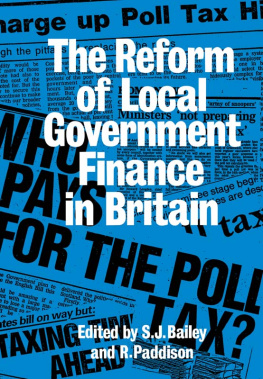THE REFORM OF LOCAL GOVERNMENT FINANCE IN BRITAIN
The Reform of Local Government Finance in Britain
EDITED BY S.J. BAILEY AND R. PADDISON
First published 1988
by Routledge
2 Park Square, Milton Park, Abingdon, Oxon, OX14 4RN
270 Madison Ave, New York NY 10016
1988 S.J. Bailey and R. Paddison
Transferred to Digital Printing 2006
All rights reserved. No part of this book may be reprinted or reproduced or utilized in any form or by any electronic, mechanical, or other means, now known or hereafter invented, including photocopying and recording, or in any information storage or retrieval system, without permission in writing from the publishers.
British Library Cataloguing in Publication Data
The Reform of local government finance in
Britain.
1. Great Britain. Local government. Finance
I. Bailey, S.J. (Stephen James), 1951
II. Paddison, Ronan
336.01441
ISBN 0-415-00530-2
Library of Congress Cataloging-in-Publication Data
ISBN 0-415-00530-2
Publisher's Note
The publisher has gone to great lengths to ensure the quality of this reprint but points out that some imperfections in the original may be apparent
CONTENTS
Ken Young
Peter G. Richards
John Berridge
Chris Himsworth
Clive Martlew and Stephen J. Bailey
Tom Wilson
Gordon A. Hughes
David King
Robert J. Bennett
Richard Jackman
Ronan Paddison
Ken Young Institute of Local Government Studies, University of Birmingham, J.G. Smith Building, P.O. Box 363, Birmingham B15 2TT
Professor Peter G. Richards Red Lodge, Hadrian Way, Chilworth, Southampton SO1 7HZ
John Berridge Dept of Political Science and Social Policy, The University, Dundee DD1 4HN
Christopher Himsworth Faculty of Law, University of Edinburgh, Old College, South Bridge, Edinburgh EH8 9YL
Professor Tom Wilson Flat 1, Chatford House, The Promenade, Clifton Down, Bristol BS8 3NG
Clive Martlew Training and Development Manager, Glasgow District Council, 48 Albion Street, Glasgow
Professor Gordon Hughes Department of Economics, University of Edinburgh, William Robertson Building, 50 George Square, Edinburgh EH8 9JY
Professor Robert J. Bennett Department of Geography, London School of Economics and Political Science, Houghton Street, London WC2A 2AE
Richard Jackman Department of Economics, London School of Economics and Political Science, Houghton Street, London WC2A 2AE
Dr David King Department of Economics, University of Stirling, Stirling KF9 4LA
Steve Bailey Department of Economics, Glasgow College, Cowcaddens Road, Glasgow G4 OBA
Ronan Paddison Department of Geography, University of Glasgow, Glasgow G12 8QQ
This book of readings was compiled during the period between publication of the Green Paper Paying for Local Government (Cmnd 9714) in January 1986 and the passage of the English and Welsh Community Charge (Poll Tax) Bill through Parliament during the first half of 1988. The Scottish Bill reached the statute book in May 1987.
Whilst the Scottish Bill had a fairly easy passage through Parliament that for England and Wales generated a particularly contentious debate centred on the lack of account taken of the ability to pay the tax. Despite a three-line whip, the Government's Commons majority of 101 was cut to 25 when the vote was taken on the Bill. It then received an equally rough ride through the House of Lords, where it secured a majority of 134 only after the Government secured an unusually high turnout of Tory Peers. (It was only the second time since 1831 that 500 Peers had turned out to vote).
The main parliamentary issue has now been resolved in the Government's favour and the community charge should be on the statute book before the end of July 1988. This book provides the reader with a balanced and comprehensive examination of the British Poll Tax system.
During recent years the financing of local government has become a key policy issue in most developed countries. In general the problem is seen as one of ever-rising local expenditures creating intolerable fiscal pressures on the local tax base. This ultimately leads to fiscal crisis, often through a local taxpayer revolt. The widening resource gap is exacerbated by the simultaneous cuts in the real levels of intergovernmental transfers, namely grants paid by the upper tier of government to the lower tier of local government.
Such cuts are deemed necessary by the perceived needs of central government to reduce, or at least constrain the increases in, public expenditure. According to the broad supply-side school of economic thought, it is held that excessive levels of public expenditure can impair the productive potential of the economy. This could occur, for example, whereby the growing public sector deprives the private sector of scarce productive resources and, in necessitating higher levels of taxation to pay for those resources, makes productive effort less rewarding. Hence growth of the economy is inhibited, ultimately to the disadvantage of society as a whole.
In tandem with this more narrow economic rationale for constraining public expenditure in general and local government spending in particular, the value of such expenditure has also been brought into question. For example, it is increasingly argued that central and local governments provide goods and services which are simply not highly valued by the recipients of those outputs. In part, this is of economic origin in that anything that is free at the point of use or consumption will be consumed until the value of the last unit received is zero. Hence it is argued there will be an inbuilt tendency to overproduce goods and services which are financed out of general tax revenues rather than from charges to consumers. Bureaucrats and politicians also have a vested interest in service expansion. More generally, it is also argued that individuals should be free to spend their own income as they wish rather than have it taxed and spent by supposedly profligate central and local governments.
Although still a matter open to dispute, the present British Government has accepted that the bulk of local government expenditures will continue to have to be financed from local taxation rather than from local user charges. This decision rests upon the conventional wisdom that local government services usually provide community-wide benefits which justify community financing or, alternatively, it would be grossly inequitable or inefficient to charge for those services which provide more exclusive benefits to recipients.
The inherent expansionary tendency of local government expenditure, the expectations of ever-rising spending on social service functions, the rising demands on service provision caused by demographic trends, the rising costs of producing public services and so on, all occurring simultaneously, increasingly bring into question the adequacy of the local resource base. Formerly, such adequacy was seen in terms of whether or not sufficient revenues would be forthcoming to finance expenditures and so ameliorate the looming local fiscal crisis. The local property tax has generally been seen as insufficiently elastic since it does not bring about an automatic increase in revenue in line with rising expenditures. The tax base (assessed value of properties) is usually fixed for years on end so that a purposive decision has to be made to increase the tax rate (called the rate poundage or mill rate). Increases in tax rates are politically unpopular and so there is an inbuilt tendency towards resource constraint.






